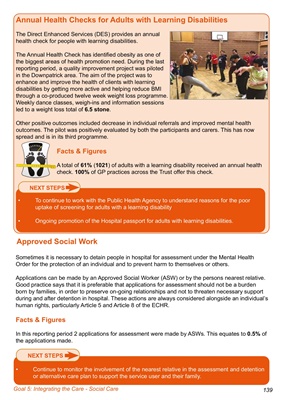
Annual Health Checks for Adults with Learning Disabilities
The Direct Enhanced Services (DES) provides an annual
health check for people with learning disabilities.
The Annual Health Check has identified obesity as one of
the biggest areas of health promotion need. During the last
reporting period, a quality improvement project was piloted
in the Downpatrick area. The aim of the project was to
enhance and improve the health of clients with learning
disabilities by getting more active and helping reduce BMI
through a co-produced twelve week weight loss programme.
Weekly dance classes, weigh-ins and information sessions
led to a weight loss total of 6.5 stone.
Other positive outcomes included decrease in individual referrals and improved mental health
outcomes. The pilot was positively evaluated by both the participants and carers. This has now
spread and is in its third programme.
Facts & Figures
A total of 61% (1021) of adults with a learning disability received an annual health
check. 100% of GP practices across the Trust offer this check.
• To continue to work with the Public Health Agency to understand reasons for the poor
uptake of screening for adults with a learning disability
• Ongoing promotion of the Hospital passport for adults with learning disabilities.
NEXT STEPS
139
Goal 5: Integrating the Care - Social Care
Approved Social Work
Sometimes it is necessary to detain people in hospital for assessment under the Mental Health
Order for the protection of an individual and to prevent harm to themselves or others.
Applications can be made by an Approved Social Worker (ASW) or by the persons nearest relative.
Good practice says that it is preferable that applications for assessment should not be a burden
born by families, in order to preserve on-going relationships and not to threaten necessary support
during and after detention in hospital. These actions are always considered alongside an individual's
human rights, particularly Article 5 and Article 8 of the ECHR.
Facts & Figures
In this reporting period 2 applications for assessment were made by ASWs. This equates to 0.5% of
the applications made.
• Continue to monitor the involvement of the nearest relative in the assessment and detention
or alternative care plan to support the service user and their family.
NEXT STEPS